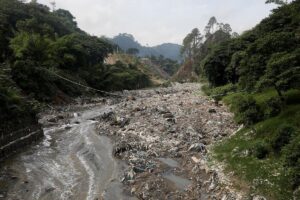
As international delegates convene in Ottawa for critical negotiations on a global plastics treaty, divisions are evident among the participating countries. The stakes are high as this treaty aims to address not only the disposal of plastics but also their production and usage, potentially making it a landmark agreement in the fight against climate change.
The urgency of these talks is underscored by a recent report from the US Lawrence Berkeley National Laboratory, which highlights that plastics production contributes approximately 5% of global climate emissions, a figure that could rise to 20% by 2050 if unchecked. The treaty seeks to cover the entire lifecycle of plastics, from production through disposal, aiming to significantly mitigate this environmental impact.
However, resistance from certain sectors complicates the path forward. The petrochemical industry and some fossil fuel-dependent countries are opposing stringent production limits and bans on specific harmful chemicals. This opposition is embodied by a group self-styled as the “Like-Minded Countries,” including major players like Saudi Arabia and China, which advocate for less restrictive measures focusing mainly on waste management.
Conversely, a coalition of over 60 nations, known as the High-Ambition Coalition, pushes for robust treaty provisions that include production caps and stringent controls on chemicals used in plastics manufacturing. This group argues that without these measures, the treaty’s effectiveness in combating plastic pollution and its broader environmental impacts will be significantly diminished.
The negotiations also see environmental groups emphasizing the necessity of production limits. With global plastic production expected to triple by 2060, these advocates argue that controlling output is essential to curbing the environmental degradation caused by plastic waste, much of which ends up in landfills, oceans, and incinerators, further contributing to carbon emissions.
The U.S. holds a pivotal yet distinct position, proposing ambitious goals within the treaty while suggesting that individual countries should determine how to achieve these targets. This approach aligns with the U.S.’s preference for flexibility in international environmental agreements.
As discussions progress, the world watches closely. The outcome of these negotiations could set a precedent for global environmental governance and directly impact the future of both plastic production and pollution. The talks in Ottawa represent not just a policy negotiation, but a significant moment in global efforts to address one of the most pressing environmental challenges of our time.




















No comment yet, add your voice below!